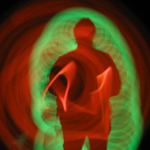The Occupation of the Media
The producer said that it was impossible to pursue stories frowned upon by the military—for example, on how the local population viewed the occupation and American troops—because she was not permitted to leave the base on her own. The height of absurdity came when the Tikrit compound came under serious attack one evening and the producer was asked by the Reuters bureau in Baghdad to phone in a report on the situation. “We couldn't find out anything [from the U.S. military],” she said, so Reuters had to cover the fighting from Baghdad, despite having a TV producer and reporter on the ground at the compound in Tikrit.
The producer frequently filmed foot patrols and nighttime raids. She said that for the latter, the military and the embedded journalists would drive for long stretches in pitch darkness. The raids themselves, she said, were blurry and confusing, and afterwards soldiers would round up suspected insurgents and sympathizers for interrogation. It was routine for the producer to wait in one room of a house while detainees were questioned in another. “Not always, but there were times when I would hear detainees screaming during the questioning,” she said. “I'm not sure what was happening but they were screaming loudly—they weren't just being slapped around.” Because she obviously was not permitted to film the interrogations, none of that material could be included in her pool feeds.
The war is corrosive not just to American ideals but to the spirits of our troops over there fighting. If they don't need to be placed in such an amoral situation then they should be thrust into that kind of world. Iraq was a war of choice. Dick Cheney's choice.




0 sick little monkeys said:
Post a Comment
Home